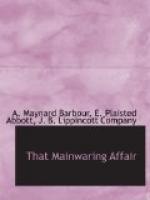“My fevered brain grew cool, my pulse steady, and my nerves firm as I proceeded at once to act upon the idea. Kneeling beside the dead man, I examined the wound. The bullet had entered above the right eye and passed downward, coming out at the base of the brain; from both wounds the blood was flowing in a slow, sluggish stream. Drawing a large handkerchief from my pocket, I bound it tightly about the head over both wounds, knotting it firmly; then carrying the body into the tower-room, I made sure that all doors were locked, and proceeded to put into execution the plan so suddenly formed. By this time I was myself, and, though the task before me was neither easy nor pleasant to perform, I went about it as calmly and methodically as though it were some ordinary business transaction. As expeditiously as possible I removed the dead man’s clothing and my own, which I then exchanged, dressing the lifeless form in the clothes I had worn on the preceding day, even to the dressing-gown which I had put on upon retiring to my apartments, while I donned his somewhat travel-worn suit of tweed. Having completed this gruesome task, I left the body in much the same position in which it had originally fallen, lying slightly upon the right side, the right arm extended on the floor, and, to give the appearance of suicide, I placed my own revolver — first emptying one of the chambers — near his right hand. On going to my desk for the revolver, I discovered the explanation of my brother’s words when he said that he had already undone my work of the preceding day, the final act of the farce I had carried out. In the terrible excitement of those moments his meaning escaped my mind; now it was clear. My own will, executed with such care, and which early in the evening I had left upon my desk, was gone. That he had destroyed it in his wrath and scorn I had abundant proof a little later, upon incidentally finding in the small grate in that room the partially burned fragments of the document, which I left to tell their own tale.




